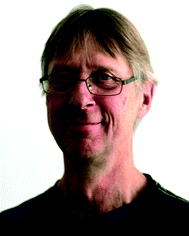In memoriam Paul Kamer (March 13 1960 – November 19 2020)
Piet W. N. M.
van Leeuwen
 a and
Javier
Pérez-Ramírez
a and
Javier
Pérez-Ramírez
 *b
*b
aLPCNO; Laboratoire de Physique et Chimie des Nano-Objets, UMR5215 INSA-CNRS-UPS, Institut National des Sciences Appliquées-Toulouse, 135, Avenue de Rangueil, F-31077 Toulouse, France
bInstitute for Chemical and Bioengineering, Department of Chemistry and Applied Biosciences, ETH Zurich, HCIE125, Vladimir-Prelog-Weg 1, 8093 Zurich, Switzerland. E-mail: jpr@chem.ethz.ch
First published on 19th January 2021
On November 19 this year we received the sad and painful news that Prof. Paul C. J. Kamer had passed away after a short period of illness. This news has been a hard blow to the scientific community where Paul could count on many friends. He enjoyed the admiration, respect and affection of all those who were lucky enough to meet him and who, with great sadness, now say goodbye to an outstanding scientist, a wonderful colleague, and an excellent person.
He studied biochemistry in Amsterdam and completed his thesis on nickel-catalysed polymerization of isonitriles under the supervision of Profs Wiendelt Drenth and Roeland Nolte in Utrecht in 1987. He broadened his knowledge further as a post-doc at Caltech and Leyden. In 1990 he started at the University of Amsterdam as an assistant professor to build, together with Piet van Leeuwen, the homogeneous catalysis group. Many barriers had to be overcome at the start and perhaps his senior colleagues frowned slightly when the unconventional Paul entered their offices to discuss the needs of the newly formed group. He was open, direct, and honest, with a good sense of humour. His warm and friendly smile had a disarming effect on everybody and he succeeded in arranging excellent facilities and in creating numerous new, fruitful collaborations. In the beginning years he could also be found at the bench and he was the first in Amsterdam to synthesize Xantphos, which would become one of the central themes of the group. He was first to present the results at a Dalton conference in Brighton in 1994.
He was appointed as a full professor in Amsterdam in 2005. In the same year he received a Marie Curie Excellence Grant to continue his career at the University of St Andrews, which he left in 2017 to become a research director of the Department of “Bioinspired Homo- & Heterogeneous Catalysis” at the LIKAT Institute in Rostock. The “dream” project of the last decade was the creation of artificial enzymes that would conduct reactions unknown to nature but of industrial relevance, of which the first successes have been published in recent years.
From 2010 till 2020 he was an Associate Editor of Catalysis Science & Technology as one of the first editors to join the board of the new journal. He played a respected and influential role in establishing the standards of the journal. Numerous manuscripts passed through his hands at high speed and with great accuracy. With time, he transitioned from handling papers in his precise area of expertise, i.e., homogeneous catalysis and biocatalysis, to dealing with heterogeneous catalysis contributions in a decisive manner. Above all fair and honest, he did not need to listen to our guidelines on ethics in publishing, as he had them in his genes. His judgments and candid, humorous one-liner conclusions will be missed. He left an enduring mark on all the members of the board and the editorial office in his decade of commitment to the Royal Society of Chemistry.
He was a visiting professor at many European universities and in all these places he will be remembered for his warm interest and the joy that social gatherings brought him. His lecture tour in Spain in 2016 for the organometallic section of the Spanish Chemical Society, RSEQ, stands out perhaps, as his science was highly admired and he made many new friends in a most pleasant environment.
He was a dedicated teacher and his training of junior co-workers was also characterized by clear do's and don'ts, which worked out very well. Busy as he always was, he would nevertheless offer a helping hand to everybody, no matter what or when. While there was no time for small talk during office hours, he very much enjoyed explaining the details of whiskey and a good cigar in his leisure hours. We will remember him as a great friend, of unequalled honesty, unconditional loyalty, and unlimited friendship.
Piet W. N. M. van Leeuwen & Javier Pérez-Ramírez
| This journal is © The Royal Society of Chemistry 2021 |

